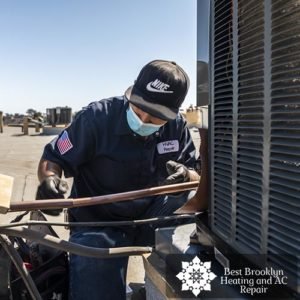 What Is a Chiller?
What Is a Chiller?
A chiller is a general term for a machine that regulates a place’s temperature by propagating a liquid, which can either be water or heat medium, as a cooling liquid whose temperature has been modified by the refrigerant cycle. Best Brooklyn Heating and AC Repair is a reputable company known by many for offering affordable air conditioning services.
Buildings and establishments require air conditioning to maintain comfort within the space. Smaller buildings can utilize air conditioning units, but once a building reaches a certain size, it is more economical to use centralized air conditioning. Centralized systems utilize “chillers,” technically enormous air conditioning units, but operate in a slightly different order due to their size.
If you are wondering how a chiller works, chillers generate chilled water to provide air conditioning in an establishment. All buildings produce a great deal of unwanted heat, from solar heat gain caused by the sun’s rays or from the people and equipment inside. This heat must be removed to maintain a comfortable temperature for the people and ensure that electrical and mechanical equipment is kept within certain thermal limits, lest it fails.
One of the most notable characteristics of chillers is the flexibility in customizing the main unit installation site and water piping system. The chiller executes a method for generating chilled water and transmitting water to the chilled water coil of the air conditioner; therefore, depending on the combination, it can be used for various purposes, including cooling large capacities and expansive areas.
On the other hand, there is typically no need to consider the difference in the height of the refrigerant pipe and the pipe length limitation, as with a direct expansion type. In addition, steam and hot water, such as industrial exhaust heat, can be used, and it is possible to build a cogeneration system that utilizes the generator’s waste heat.
The Advantages and Disadvantages of a Chilled Water System
Water-cooled chillers play a crucial role in numerous industries. They contribute to the consistent operation of medical equipment and keep milk cool until it is distributed to markets. They assist the pharmaceutical, brewing, and meat and poultry processing industries. In choosing a chiller for your business, you’ll need to choose between an air-cooled chiller and a water-cooled chiller. Here are the primary advantages and disadvantages of water-cooled chillers to aid your research. Additionally, if you need air conditioning services, feel free to count on us at Best Brooklyn Heating and AC Repair for comprehensive assistance.
The Advantages of Water-cooled Chillers
- Longer life expectancy.
Water-cooled chillers typically require less frequent replacement than air-cooled chillers. They are immune to environmental factors such as rain, snow, ice, and heat, which makes them more resilient.
- Noise-free functioning.
Unlike air-cooled chillers with noisy pipes and vents, water-cooled chillers are silent. The air-cooled cooler does not produce the same noise when water flows through the system, causing expansion and contraction. In environments where passengers and passengers may experience noise, such as hospitals and schools, quiet operation is crucial.
- Energy Efficient.
The film factor is 10 to 100 times greater in water-cooled chillers than in air-cooled chillers. This means that refrigerators cooled with water transfer heat more proficiently. The outcome of the business is energy cost savings.
- Safety. Instead of toxic chemicals, this machine uses water as a refrigerant. Making items and individuals that come into contact with it safer.
The Disadvantages of Water-cooled Chillers
- Higher cost. Air-cooled chillers are much more economical than water-cooled chillers because the latter require parts such as cooling towers and condenser water pumps.
- More maintenance. Since water-cooled chillers have more parts, their maintenance is more involved. Companies should budget for periodic inspections, water treatments to eliminate impurities, and routine cleaning of the chiller’s machinery. The more components a machine has, the more things can go wrong, so water-cooled chillers are more likely to demand repairs than air-cooled chillers.
- Complex installation. The additional components of water-cooled chillers make the system’s installation extra difficult. This can result in higher installation labor costs for water-cooled chillers than for air-cooled chillers.
- Requires Mechanical Room. A mechanical room is required to shelter a water-cooled chiller. This ensures proper operation of the chiller with its cooling tower and additional components.
- Not Suitable For Drought-Affected Areas. Since the system uses a substantial amount of water, water-cooled chillers are not ideal in regions with a scarcity of water. With a water-cooled chiller, water-paying businesses can anticipate an increase in water costs. Several drought-stricken regions impose restrictions on the use of water-cooled chillers.
- Less functional in humidity. Even though water-cooled chillers are more proficient than air-cooled chillers, they function less effectively in damp environments. This is because humidity increases the wet-bulb temperature, which implies how effectively water absorbs the heat. Water-cooled chillers can cause building occupants to feel cold and damp in humid areas.
You may call our customer services team anytime if you need further comprehensive assistance with the chiller air conditioning system. Our dispatchers will be happy to provide you with the aid you need!